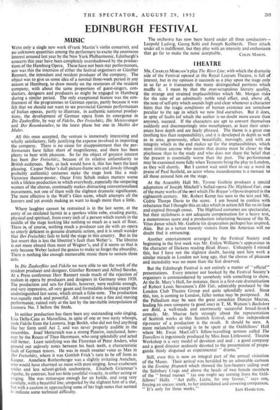I HEATRE
MR. CHARLES MORGAN'S play The River Line, with which the dramatic side of the Festival opened at the Royal Lyceum Theatre, is full of interest, but in my opinion it succeeds as a play upon the stage only in so far as it transcends the many distinguished portions which muffle it. I mean by that the over-scrupulous literary quality, the strange and strained implausibilities which Mr. Morgan risks for the sake of an admittedly noble total effect, and, above all, the note of self-pity which sounds high and clear whenever a character hints that the tragic conditions of human existence are somehow peculiar to the age in which we now find .ourselves. But it does, in spite of faults (of which the author is no doubt more aware than anyone), succeed. If the characters are apt to convert themselves suddenly and disconcertingly into mouthpieces, at least their utter- ances have depth and are finely phrased. The theme is a great one (nothing less than responsibility), and it is developed in depth as well as in area, generously, often beautifully, movingly, and with an integrity which in the end makes up for the implausibilities, which must irritate anyone who insists that drama must be closer to the playhouse than to the study and who does not share the belief that the present is essentially worse than the past. The performance may be examined more fully when Tennents bring the play to London, as they will shortly. But I cannot wait until then to say a word in praise of Paul Scofield, an actor whose incandescence is a menace to all those around him on the stage.
At the Assembly Hall Mr. Tyrone Guthrie produces a special adaptation of Joseph Mitchell's ballad-opera The Highland Fair, one of the many works of the sort which The Beggar's Opera inspired in the eighteenth century. Mr. Robert Kemp has seen to the text and Mr. Cedric Thorpe Davie to the score. I am bound to confess with reluctance that I thought this an idea which in action fell flat on its face and expired through ennui. The Highland costumes are spectacular, but their stylishness is not adequate compensation for a heavy text, a monotonous score and a production infuriating because of the St. Vitus dance which Mr. Guthrie (in desperation perhaps) has inspired. Alas. But as a tartan travesty visitors from the Americas will no doubt find it entrancing.
Another entertainment arranged by the Festival Society and beginning in the first week was Mr. Emlyn Williams's appearance in the character of Dickens reading Bleak House. Unhappily I missed this, but I have not the slightest doubt, having seen him work a similar miracle in London not long ago, that the chorus of pleasure and incredulity was no more than the feat deserved.
But the Edinburgh Festival is not entirely a matter of "official" presentations. Every interior not booked by the Festival Society's organisers is commandeered by somebody with something to show. At the St. Mary's Hall, for instance, there is a first-rate dramatisation of Robert Louis Stevenson's Ebb Tide, admirably produced by the London Club Theatre Group and quite splendidly acted. Since
this, too, is coming to London, fuller notice may be postponed. At the Palladium may be seen the great comedian Duncan Macrae, leading his own company (a good one) in T. M. Watson's Bachelors are Bold, a well-made and enormously successful broad-Scotch comedy. Mr. Macrae feels strongly about the representation of Scottish works at this Scottish festival, and this independent rip-roarer of a production is the result. It should be seen. A more melancholy evening is to be spent at the Oddfellows' Hall where Mr. Ewan MacColl's fellow-travelling sermon called The Travellers is ingeniously produced by Miss Joan Littlewood. Theatre Workshop is a very model of devotion and zeal : a good company and a good director zealously devoted to the presentation of propa- ganda thinly disguised as experimental " drama."
Still, even this is now an integral part of the annual visitation of the Muses. Their arrival was heralded by an admirable cartoon in the Evening Dispatch which showed the lyre-bearers sailing over the Salisbury Crags and above the heads of two female members of the " broad masses"" (as one might say coming from the Odd- fellows' Hall). "Act pally, Lizzie, for ony favour," says ono, forcing an uneasy smirk, to her intimidated and cowering companion.


































 Previous page
Previous page